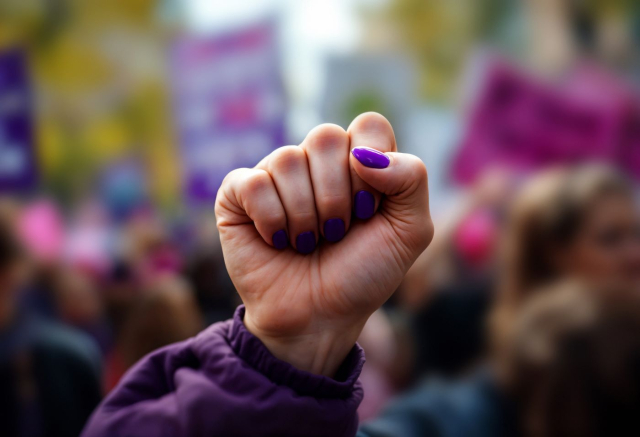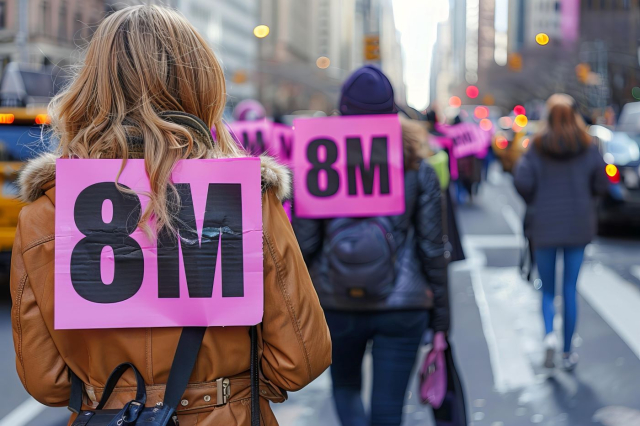March 8 is a crucial date in the fight for gender equality and the defense of women's rights . In Spain, International Women's Day is celebrated with great force every year, standing out as a day of vindication, visibility and reflection on the progress achieved, but also on the challenges that continue to be present in Spanish society. From the first mobilizations to the great feminist strikes of recent years, 8M has taken on a unique dimension in Spain.
History of 8M in Spain
The celebration of 8M in Spain has a long history of struggles and progress. Although the feminist movement in the country began to take shape at the beginning of the 20th century, it was in the 70s and 80s when International Women's Day began to gain relevance, in the context of the transition to democracy after the Franco dictatorship.
In 1975, the UN officially declared March 8 as International Women's Day, uniting women around the world to fight for equal rights. In Spain, this day was celebrated for the first time in 1977, just as the return to democracy was being consolidated. In those early years, Spanish women began to organize and take to the streets to demand their rights, such as the right to abortion, equal pay and better working conditions.
In 2008, on the occasion of the Centenary of Working Women , March 8 gained greater visibility in Spain, paving the way for the major mobilizations of the last decade.
8M protests in Spain
8M in Spain has historically been a day of demanding women's rights. In each edition, feminist groups and women's associations fight for progress in different areas. Some of the main demands that have been highlighted in recent years include:
- Equal pay: Despite progress, women still earn, on average, 20% less than men for similar work. Equal pay remains one of the main struggles of 8M.
- Gender violence: #NiUnaMenos is a slogan that has gained strength in the country, demanding an end to gender-based violence. The figures for femicide continue to be alarming, which makes the fight against gender violence a priority.
- Reconciling work and family life: Women continue to be primarily responsible for caring for the home and children. Reconciliation remains a central issue in ensuring equal opportunities.
- Reproductive rights: The defense of sexual and reproductive rights, including access to safe and free abortion, remains one of the key demands of 8M, especially with attempts to roll back some policies.
- Political parity: The under-representation of women in politics is another crucial issue. Despite progress, women remain under-represented in senior positions and parliamentary seats.
The 8M mobilization: Strikes, marches and actions

In recent years, March 8 in Spain has been synonymous with large-scale mobilisations. The 2018 feminist strike marked a historic milestone, with more than 5 million people mobilised across the country, both on the streets and in their workplaces and homes. This strike has been an example of how Spanish women have taken control of this date to demand profound changes in society.
Feminist marches are taking place in the main cities of Spain: Madrid, Barcelona, Valencia, Seville and Bilbao are filled with women and men raising their voices for equality. In addition, many universities, schools and workplaces are organizing activities to raise awareness about the need to move towards a more equitable society.
In the digital sphere, social media plays a fundamental role in spreading messages and mobilizing. Hashtags such as #8M2025 , #Women'sDay and #GenderEquality go viral every year, making March 8 a day of global visibility for feminism.
The impact of 8M on Spanish society
The 8M in Spain has had a transformative impact on society, helping to make inequalities visible and raise awareness about the importance of gender equality. The massive mobilization has allowed feminist issues to reach the media, politics and the business world, creating a climate of reflection and debate throughout society.
In addition, it has promoted important legislative changes, such as the 2004 Law against Gender Violence and laws on gender equality and political parity. However, despite the progress, there is still a need to further implement effective public policies and change mentalities in order to eradicate violence and discrimination against women.
March 8 in Spain will continue to be a key date for the feminist struggle. With each mobilization, the movement for gender equality strengthens and expands, bringing together more women and men committed to the cause. In 2025, as in previous years, March 8 will be an opportunity to reflect on the achievements made, but also to demand new victories in the fight for a more just, equitable society free of sexist violence.
Join the fight, share this article and actively participate in the 8M mobilization. Equality is a right, not a privilege!
